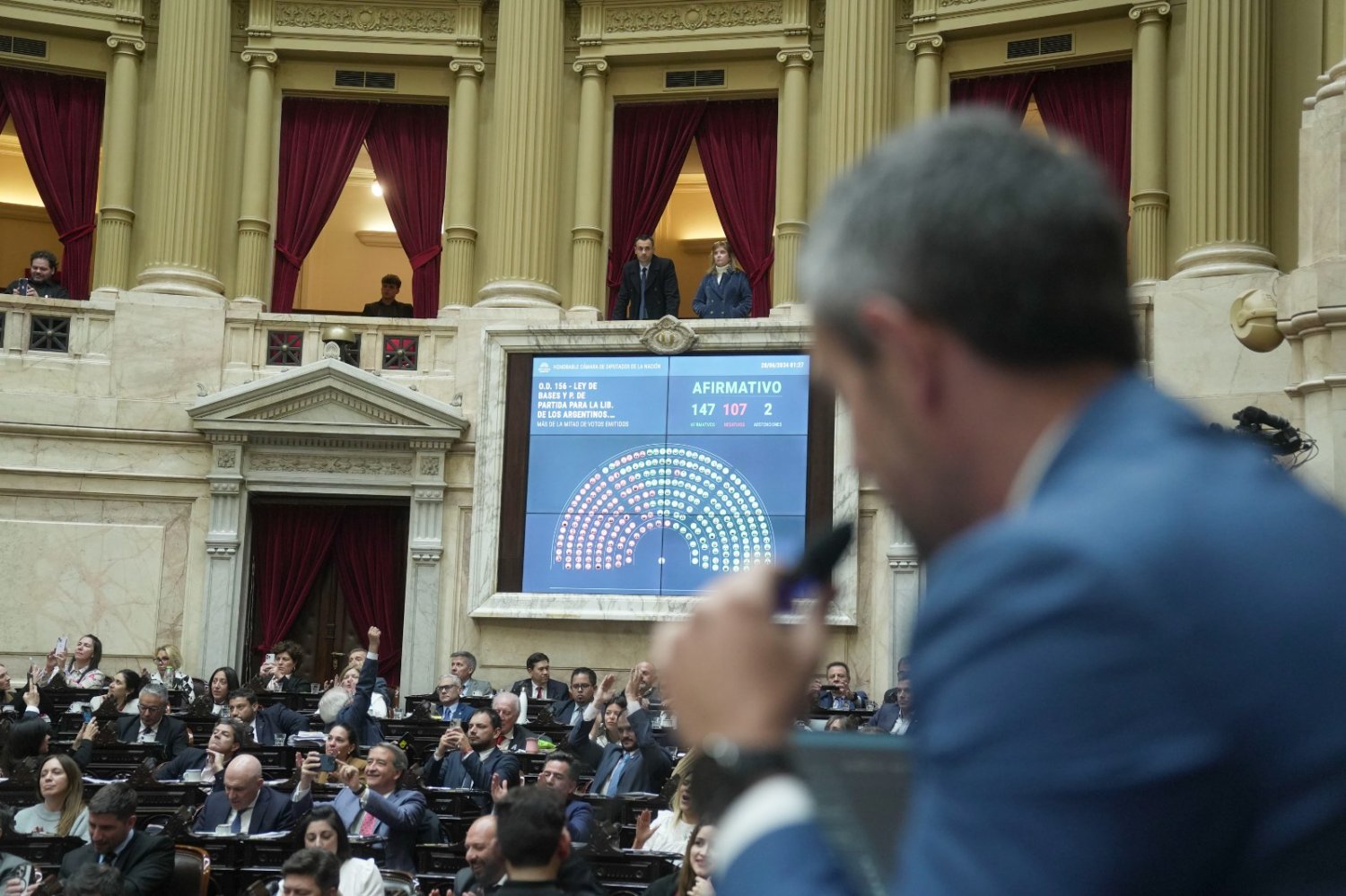
After exactly 6 months after the entry of the Bases Law in the Chamber of Deputies, just this Thursday the government of Javier Milei can take his first two laws, including the “fiscal package”. Without the support of the collaborationist blocks The government had no chance of getting it approved. The PRO, the UCR, Pichetto’s bloc, Federal Innovation, the Civic Coalition and the Tucumans from the former Union for the Fatherland put all their efforts into its approval and gave it their votes.
In it Senate There was also the collaboration of those blocks, but they reached a agonizing tie with corruption scandals by the exchange of votes for positions. He was denounced in the session by the Left Front bench, requesting the annulment of the entire treatment for that reason. Alejandro Vilca said that “The corruption and give and take of this law shows the shame of those who govern us today, they use the same methods of the caste”. Christian Castillo advertisement “We are going to report it to the courts, they are the daughters of a corrupt act”.
The law bases It was finally approved in the House of Representatives with the modifications made by the Senate with 147 affirmative votes, 5 more than those obtained in the average sanction. 4 votes from the UCR that had previously abstained (Manes, Juliano, Carbajal, Coli) were added and 1 from the PRO had been absent. It contains a labor reform that takes away workers’ rights and attacks on public employment, the RIGI, the delegation of powers, among others. It maintains a package of companies to be privatized, but without Aerolíneas Argentinas, Correo Argentino and the public media because the government did not get the votes to insist, and also had to leave out the elimination of the retirement moratorium.
He tax package was approved but re-included two key chapters for the government and the governors that the Senate had rejected. income tax restitution for salaried employees it was approved with 136 affirmative votes, 4 more votes than the average sanction. He had the Support from 3 Catamarcans from Union for the Homeland: Nóblega (had already voted in favor), and Ávila and López went from abstention to affirmative. reduction of personal property for the richest it was replaced with 134 affirmatives, 8 less that the half sanction.
Much of the session’s debate focused on the legitimacy and constitutionality to insist on the chapters that the Senate rejected from the fiscal package. Two interpretations clashed, which ensure that there will be judicialization at least of the restitution of profits. Those who denounced the unconstitutionality were a large part of Union for the Homeland, the Left Front and a few deputies from the UCR like Carbajal and Juliano.
The The expectation of the day was focused on the restitution of the income tax, which everyone announced was going to be adjusted. Not only did the conflicting interests of the northern and southern provinces. Some also appeared resistance of UCR deputies who had supported her in April but now questioned her vote. Several, such as the deputy Karina Banfi of the province of Buenos Aires, complained to the chief of staff Guillermo Francos for paying the political costs of accompanying the restitution of profits, while those who benefit from this measure are Peronist governors such as Axel Kicillof who do not support her. In that province, radicalism controls thirty municipalities, and negotiations and requests to the executive power appeared at the last minute.Miguel Angel Pichetto left a message in the same sense when he stated that “The governors of Unión por la Patria must be very attentive tonight, watching what the end of this process will be. Governor Kicillof must be very attentive”. Finally, the only UCR representative who changed her vote was Roxana Reyes of Santa Cruz: from the affirmative it went to abstention.
The government pressure made itself felt on the Peronist governors closest to Milei, especially on Catamarca. Raúl Jalil of Unión por la Patria was one of the governors who met this Tuesday with the governors and collaborationist blocs to show his willingness to support the restitution of profits. German Martinez of Union for the Homeland recognized it at the end of his speech: “the pressure and the squeeze, the extortion to which they subjected all the governors is inconceivable and unprecedented”. A way to explain or justify the new votes that changed sides in their bloc.
Nicholas del Caño of the left recalled that when Milei was a deputy he voted to eliminate the 4th category of profits “he said that it was an filthy tax, that it stole workers’ salaries” and clarified that now “Anyone who earns $1.4 million is going to have their hand in the pocket of many workers who make an enormous effort, who work in tremendous conditions”.
The rest of the titles of the fiscal package were approved with the Senate changes with 144 affirmative votes (4 more than the average penalty). This includes money laundering, increased taxes on monotributistas (more on the lowest categories), changes to tobacco and royalties. The elimination of the social monotax that was rejected by the Senate was left out.
The Deputies proposed to insist on another article eliminated by the Senate. The one that proposed that the Executive Branch review at least 2% of the almost 5% of what the state loses in revenue by granting tax benefits to business sectors (automotive, mining and knowledge economy like Mercado Libre) and to provinces like Tierra del Fuego. He did not succeed despite obtaining 148 affirmative votes, because he needed 2/3 (172) by the majority with which the Senate rejected it.
The government achieved the sanction of these laws after a tortuous path of negotiation with the collaborationist blocks. Not only did they have to back out of several chapters and articles, but it included political crises with the fall of the first session in February, corruption scandals, a tie in the Senate, persistent protests outside Congress and 5 people who are still illegally detained. But the path for the government with these laws is not over: there will be judicial proceedings for the restitution of the income tax for being unconstitutional, and the left has already warned that it will denounce the corruption surrounding these laws in court. As said Christian Castillo of the Left Front “the dispute continues in all areas and also in the streets”.
Source: www.laizquierdadiario.com

